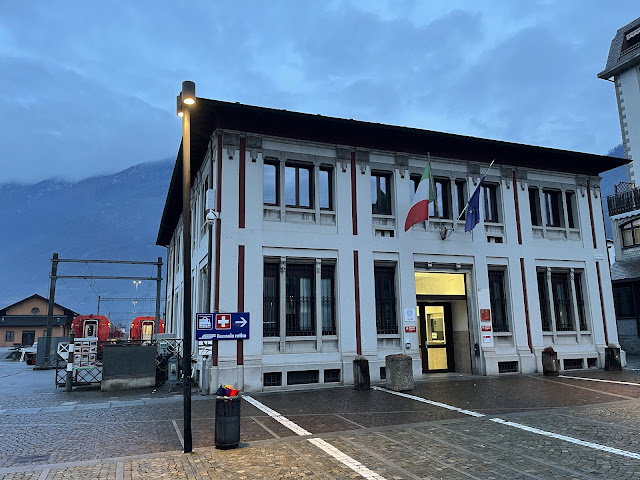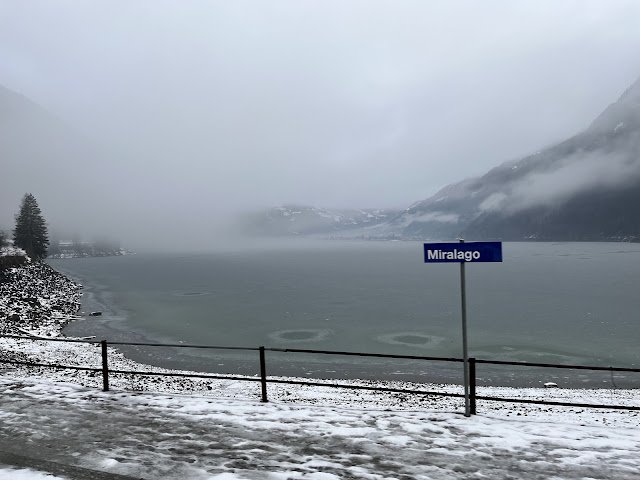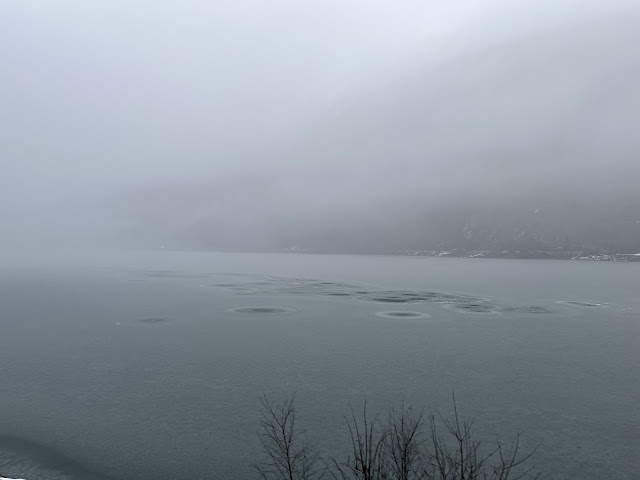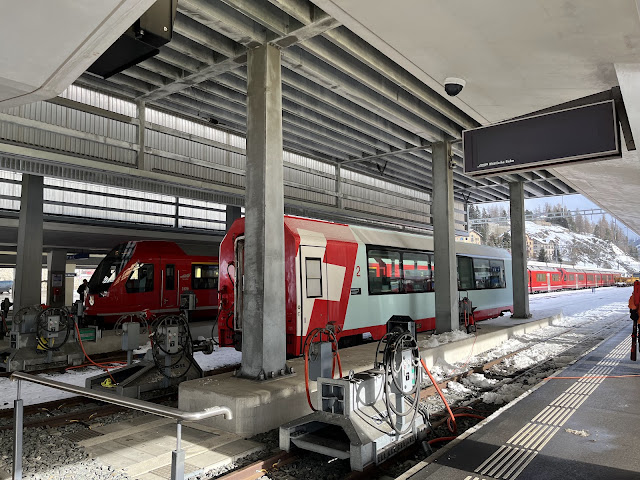A lot of the stuff I do on these vacations is spur-of-the-moment -- I'll look at where I'm going beforehand to get a sense of the things I want to do, but what exactly I do and when tends to be something I come up with on the fly. That was definitely not the case for these couple Swiss days, as I had everything planned down to the minute. That's in part because of the way their ticketing system works (individual train tickets are absurdly overpriced, but you can get a somewhat more reasonable deal by buying day passes if you plan far enough in advance -- I paid CHF 52 for each of my two day passes, whereas buying regular tickets would have cost nearly $200 a day, and Bernina Express tickets cost well over a hundred dollars each way for only a portion of the route I took). I had this planned out so much that I even knew what I wanted to write in this blog post -- it was going to be titled "Bernina on the cheap" and was going to be all about how you could have just as good of a time riding the "normal" train without spending as much money. Well, I had to throw all that out the window once I actually rode the train and learned how much better the cheap option is than the RhB's flagship offering.
The trains used on the Bernina Line are a bit funny -- they have an electric multiple unit pulling a line of traditional carriages, with these older ones used on normal services and the panoramic ones seen on the right of the first picture being used on the Bernina Express. Most people went for the newer EMU, but the old trains have a trick up their sleeve that makes them by far the better option...
They have windows that open further than any train car I've ever been in, well past half way! Clearly when these cars were being built, people still understood how nice opening windows are for views and photos. On the other hand, the panoramic windows on the Express cars don't open at all, and the newer cars on the regular trains only have a few opening windows.
Obviously you can't get between the older and newer parts of the train, but you aren't really missing anything by sticking in the older part. And yes, that is a flip-dot destination sign on a modern (2010s) train -- for some reason, Stadler stuck with flip-dots long after the rest of the industry abandoned them, despite LED signs being superior in pretty much every way.
I decided to stick in the half-passenger/half-bike car right in the middle of the train, since it was the emptiest car I could find. In the bike half of the car, there was this control panel for the PA system just completely hanging out in the open. If I had any idea what I was doing (and it probably wouldn't have been difficult to figure out if I understood German), it doesn't look like there would be anything to stop me from making an announcement to the whole train! I traveled on a couple other trains like this and all of them had this panel hanging out in the open, so I guess the RhB isn't particularly concerned about these things. (It could be that it just doesn't work, but there's a sticker dated December 24 on the blue part, so it seems like it's being kept up to date.)
The route starts out with a short street-running section in Tirano, before quickly crossing the border into Switzerland. While Italy and Switzerland are both in the Schengen Area, there is technically a border crossing for customs only, but I never had any issues (even on the day I forgot my passport, towards the end of the trip).
Pretty impressive ice and snow formations up here too.
Alp Grum station has a hotel and restaurant which are pretty much only accessible from the train. It would be cool to stay here, but I'm glad I spent the night in Tirano so I didn't have luggage distracting me while on the train. (It's also a lot cheaper to stay in Italy...)
I was hoping for a beautiful sunny day, but it was all cloudy going over Bernina Pass. It was still beautiful in its own way!
The sun started coming out on the way down the far side, towards St Moritz. The blue sky made this area even more stunning.
At Pontresina Station, we sat for a while (since this is a big connection point for people going pretty much anywhere other than St Moritz), with a locomotive next door which had a window to look in on the machinery inside. I've never seen anything like that before!
I'd love to ride that funicular way up to the top of that mountain.
The RhB network is designed for transfers at specific points, and St Moritz isn't one of those places. That's the train I'm taking next, but I have to wait a whole hour for the next one. The direct route is to get off at Pontresina and take the other line from there a couple stops before changing trains again, and that's what I did the next day, but this day I wanted to make the detour to St Moritz.
St Moritz is the south end of the Glacier Express, which uses similar panoramic carriages as the Bernina Express. I didn't ride the Glacier Express route on this trip, but I would definitely love to some point in the future.
When I was planning this stop, I figured that I would either walk into town or go for a walk around the lake. What I didn't realize was that in winter, there is no lake, just a solid sheet of snow-covered ice! So of course I had to go walk around down there. Apparently, the lake is also used for "white turf" horse racing in the winter, which seems a bit crazy! In the second-to-last picture, you can see a funicular snaking its way up from the town of St Moritz -- I would have loved to ride that, but it's nearly $100 round trip, which is absolutely insane.
And to wrap up this post, here's the UNESCO World Heritage sign for the rail line that I was just on, and the one coming up next. I'm going to have to wrap this post up here because it's nearly midnight and I need to get some sleep, even though this is just train 1 of 6 from day 1 of 2 of exploring the RhB network -- I took around 750 photos on this one day, so this is going to be a lengthy series. I hope you're enjoying it!



















































I've been to some of these areas in Switzerland, but they certainly look different in the winter than in the summer when I saw them! I suppose that is to be expected, but it is interesting to see them in a different way.
ReplyDeleteYeah, I imagine it would be a lot different without all the snow! I love snowy landscapes like this, so I just had to come in the winter.
DeleteBeautiful!
ReplyDelete